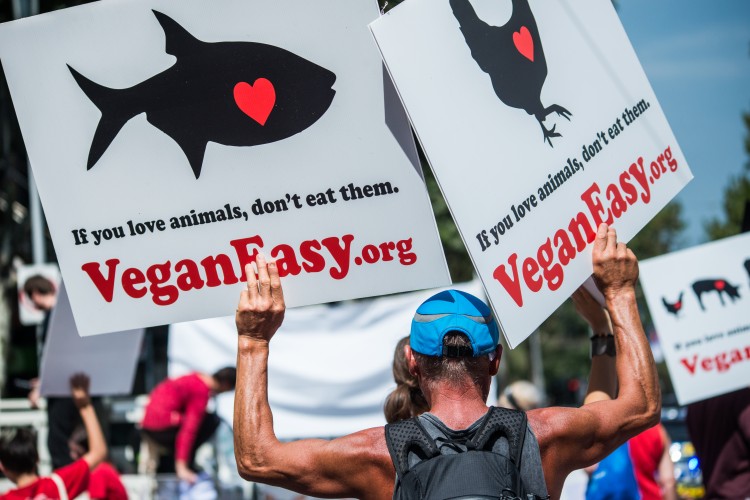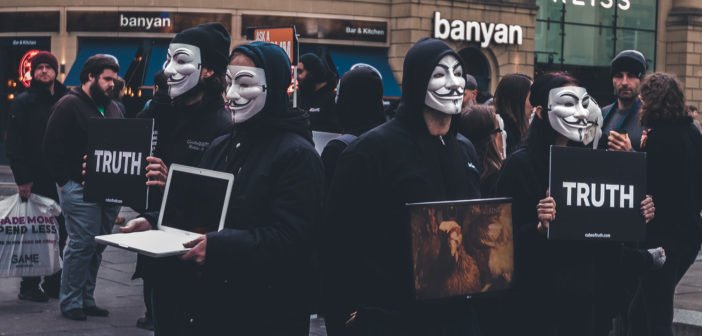You’ll often hear people involved with animal rights organization Anonymous for the Voiceless (AV) claim that AV’s method of getting people to “go vegan” is the most effective. How is this measured? AV organizers used to take a tally at the end of each Cube of Truth (the name of their street based outreach format). This tally was a count of how many conversations “outreachers” had with members of the public who had “taken veganism seriously.” Recently though, AV ditched the tally. That’s not a bad thing, because something as subjective as a conversation shouldn’t really be used as a metric, especially if you’re boasting that your method is the most effective. Sure, anecdotes from conversations bring in some qualitative data, but if you’ve followed AV for even a short length of time, you’ll know they’re pretty keen on numbers and evidence.
In terms of getting people to go vegan, the 2019 Vomadlife survey shows that street activism such as Cubes of Truth is one of the least effective tactics when it comes to being the “first” thing that makes people “seriously consider” going vegan. It is dismally ineffective, in fact. Only 1.4% of the vegans surveyed said it was “public activism” that first made them think about making the switch. Documentaries and conversations with family were the big hitters.
Breaking it down further, of the people who said that “public activism” was the first thing that got them interested in veganism, more people were influenced by someone handing out a leaflet than a Cube of Truth.
So, we know that Cubes of Truth are ineffective at being the first thing that gets people to go vegan. But if someone is considering going vegan, then AV recommend a service that provides support and encouragement for them. This takes the form of Challenge 22. AV, as well as other outreach groups and most of the top vegan celebrities all link to this program. In the vegan outreach community, this is the program to go on if you want to make the change. So far, 365,000 people have taken the challenge.
This is how it works. You get added to a Facebook group with other potential new vegans. For 22 days, you get assigned daily tasks (for example, cook something using tofu). There are also mentors, who you can ask for advice on all things vegan: recipe tips, food shopping queries, or ethical quandaries. Of course, not everyone in the group will go vegan after the 22 days. In fact, when I was a mentor for a group, only around 30 people in the group posted regularly out the 700 who were in it. I believe this was an unusually large group, as groups are usually around 300-400. That’s a small number of people engaging. Even if all 365,000 people who’ve taken the challenge had gone vegan, it’s not a great result considering Challenge 22 has been going since 2014. And AV has been going since 2016 and handed out hundreds of thousands of cards with the link to Challenge 22 on them (each “serious conversation” was closed with a card being handed out). Not to mentioned the social media celebrities with hundreds of thousands of followers each, who link Challenge 22 in pretty much every YouTube video or social media post they make.
The numbers aren’t looking good then. But what about AV’s approach to advocacy? What’s the winning formula they proposed? Co-founder Paul Bashir recently posted that “[G]uilt is effective. It’s the only thing that gets people to go vegan.” The only thing? Well, no – that’s not what the research shows. It’s true that guilt is commonly used in marketing, but it’s far from being the only tactic. And yes, AV is marketing – they’re selling a lifestyle, a whole new identity. They’re asking people to make radical, transformational change in their lives. Thar’s a hard sell. So, when someone says they’ve found the only way to make people change, it’s worth looking at.
This report looked at environmental messaging. It turns out that instilling a sense of pride in people was much more effective at getting them to consider changing their behaviors than guilt. According to the research, “The results revealed a clear pattern across all of the groups. […] [P]articipants who were exposed to anticipation of pride consistently reported higher pro-environmental intentions than those exposed to anticipated guilt.”

Another study shows that guilt tripping individuals is less effective than encouraging collective responsibility: “Better to frame it as our problem, an issue threatening all of us, than as a story of personal responsibility.” This is in sharp contrast to AV’s often repeated mantra that they will “hold people to account.”
Deploying the guilt appeal tactic isn’t a silver bullet. It can be effective, but it needs to be used wisely. You can’t just use it across the board and expect it to work on everyone, all the time, in any location. Yes, it can work – but also, it can backfire, as this research shows: “Guilt can inspire constructive action, or adversely, encourage negative attitudes and even anger.”
Positive approaches can be used as well as negative approaches like the guilt tactic.
It’s clear that to be effective, street based vegan outreach needs to really do some digging. Groups like AV need to dig deep into the available research, trial some different approaches (maybe show footage from sanctuaries, not slaughterhouses?), and understand that there is no such thing as one size fits all when doing public education.
Caveats
The Vomadlife survey referred to isn’t very comprehensive in terms of getting a broad spectrum of vegans from around the world. 74% of participants were from 5 countries: Australia, the UK, the US, Canada and New Zealand.
Additionally, I don’t feel “go vegan” is an effective directive to make anyway, regardless of the tactics used (see my previous posts here and here).
Featured image: an Anonymous for the Voiceless Cube of Truth demonstration. Image credit Nick Rowland, CC BY-SA 2.0.






1 Comment
The AV method is not just based on guilt tripping. We invoke a feeling of injustice in people. Moral outrage. Guilt is only a small part of the feelings a person goes trough when being outreached.
Also activism is very important socially. seeing other people’s express vegan view’s in real life is essential to staying vegan.
Comparing street activism to web activism is fundamentally very flawed because we don’t fish in the same pond. Documentaries, sites and influencers all share the same audience. On the street we reach people that would never be reached using internet tactics. Most people we talk to have never heard of veganism or seen the footage. You can say we are ineffective. But compared to a facebook post we are countless times more effective in reaching every demographic.